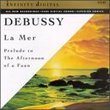| All Artists: Ludwig van Beethoven, Mikhail Pletnev Title: Beethoven: Piano Sonatas - Moonlight, Waldstein & Appassionata - Members Wishing: 0 Total Copies: 0 Label: Virgin Classics Original Release Date: 1/1/2006 Re-Release Date: 9/12/2006 Genre: Classical Styles: Chamber Music, Forms & Genres, Sonatas, Historical Periods, Classical (c.1770-1830), Romantic (c.1820-1910) Number of Discs: 1 SwapaCD Credits: 1 UPC: 094636328027 |
Search - Ludwig van Beethoven, Mikhail Pletnev :: Beethoven: Piano Sonatas - Moonlight, Waldstein & Appassionata -
 | Ludwig van Beethoven, Mikhail Pletnev Beethoven: Piano Sonatas - Moonlight, Waldstein & Appassionata - Genre: Classical
|
Larger Image |
CD DetailsSimilarly Requested CDs |
CD ReviewsPletnev does something different--and AWESOME! David R. Eastwood | Long Island, NY | 05/19/2007 (5 out of 5 stars) "I first heard Pletnev playing the Waldstein sonata on an FM radio station while I was driving, and I HAD to buy his recording! His Moonlight and Appassionata sonatas are excellent, but I would recommend you listen carefully to the first movement of his Waldstein: he tremelo playing is so rapid and even that he can create the illusion of a sustained note and then, as he plays alternately softer and louder on that note, he creates an illusion that no piano can really produce: "swelling" in volume. In reality (as most people already know), the pedals of a piano can let a player take a note from loud to soft--but not (unlike many OTHER instruments, such as organs or violins or horns) from soft to loud. I own about 50 CDs with Beethoven's piano sonatas on them, and I have never heard anything like this. I have repeatedly listened to 18 other famous pianists playing the Waldstein, and a few come close to this effect, perhaps deliberately, perhaps by chance. I have spoken with several pianists about this, and they have found it a very remarkable and interesting way of playing. Two of my friends prefer the playing of Emile Gilels, but I would travel 50 miles to hear Pletnev play Beethoven. Happy listening!" A thumpy 'Moonlight," but after that, truly great Beethoven Santa Fe Listener | Santa Fe, NM USA | 09/29/2008 (5 out of 5 stars) "This is a reissue of a 1996 Beethoven program, and I detect that Pletnev has come a ways since -- wit, perversity, and mischeif are absent here. His "Moonlight" Sonata strains to be different, however: it's strenuous and thumping in the first two movements, and strongly attacked in the finale, which Pletnev doesn't play for dazzling fingerwork. I doubt I will return to hear this anti-poetic reading again.
I was quite impressed by the version of the "Waldstein" that was part of Pletnev's Carnegie Hall recital on DG. Like Richter, he has such effortless technical command that he can make the piano do whatever he wants, and I like what he wants in this sonata. Hearing how strong and confident Pletnev is in the first movement, one is reminded that many others (e.g., Schnabel, Brendel, Kempff) are cautiously avoiding stumbles. I wish the slow introduction to the finale were more mysterious and premonitory; Pletnev seems rather objective. Yet the opening of the finale couldn't be more sensitively phrased, and the rest captures Beethoven's triumphant middle-period style as perfectly as anyone since Schnabel and Serkin ever has. My standard for the "Appassionate" comes down to Serkin, Richter, and Pollini. Pletnev is as powerful and self-asssured as any of them, and he shows as much temperament. Don't expect the heavens to open, however. His conception of the first movement, and later the finale, depends on a somewhat tame opening building to a volcanic finish. Pletnev held my attention in one great arc from beginning to end. The second movement is masterful, largely due to Pletnev's original touch and phrasing. Beethoven creates magic from very simple ingreients here, and Pletnev knows how to do that, too. Hapily, he doesn't pound the finale to death or try to persuade us that this is the Flight of the Bumblebee -- a slower tempo allows for mroe eloquence and depth. With a musician as mercurial as Pletnev you can't expect to agree with every new notion he brings to a score, but this Beethoven recital is a showcase for temperament and incredible skill. Too bad that Virgin's close-up sonics are bangy and clangy; the fortissimos cause a bit of ear sting." |

 Track Listings (9) - Disc #1
Track Listings (9) - Disc #1
